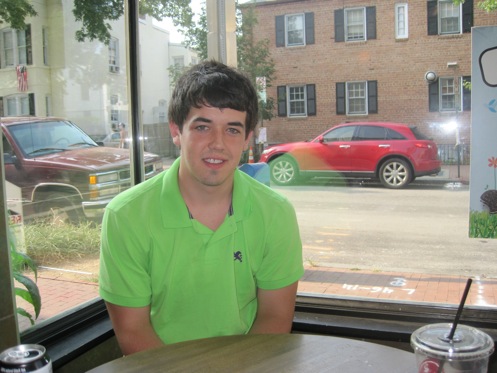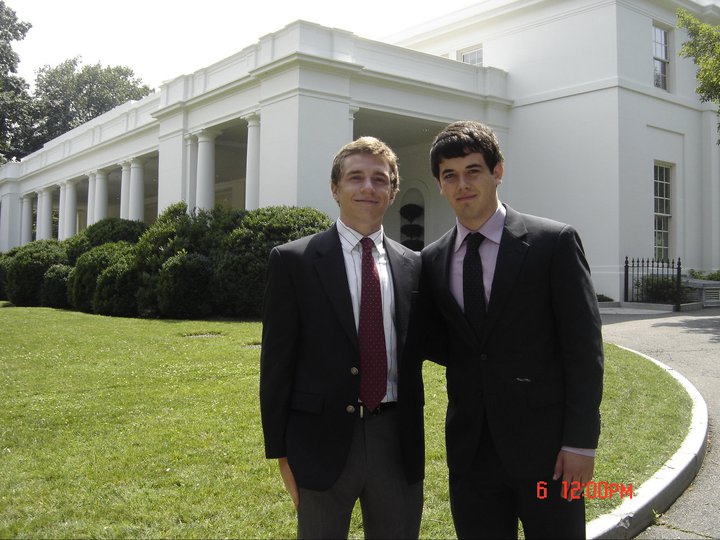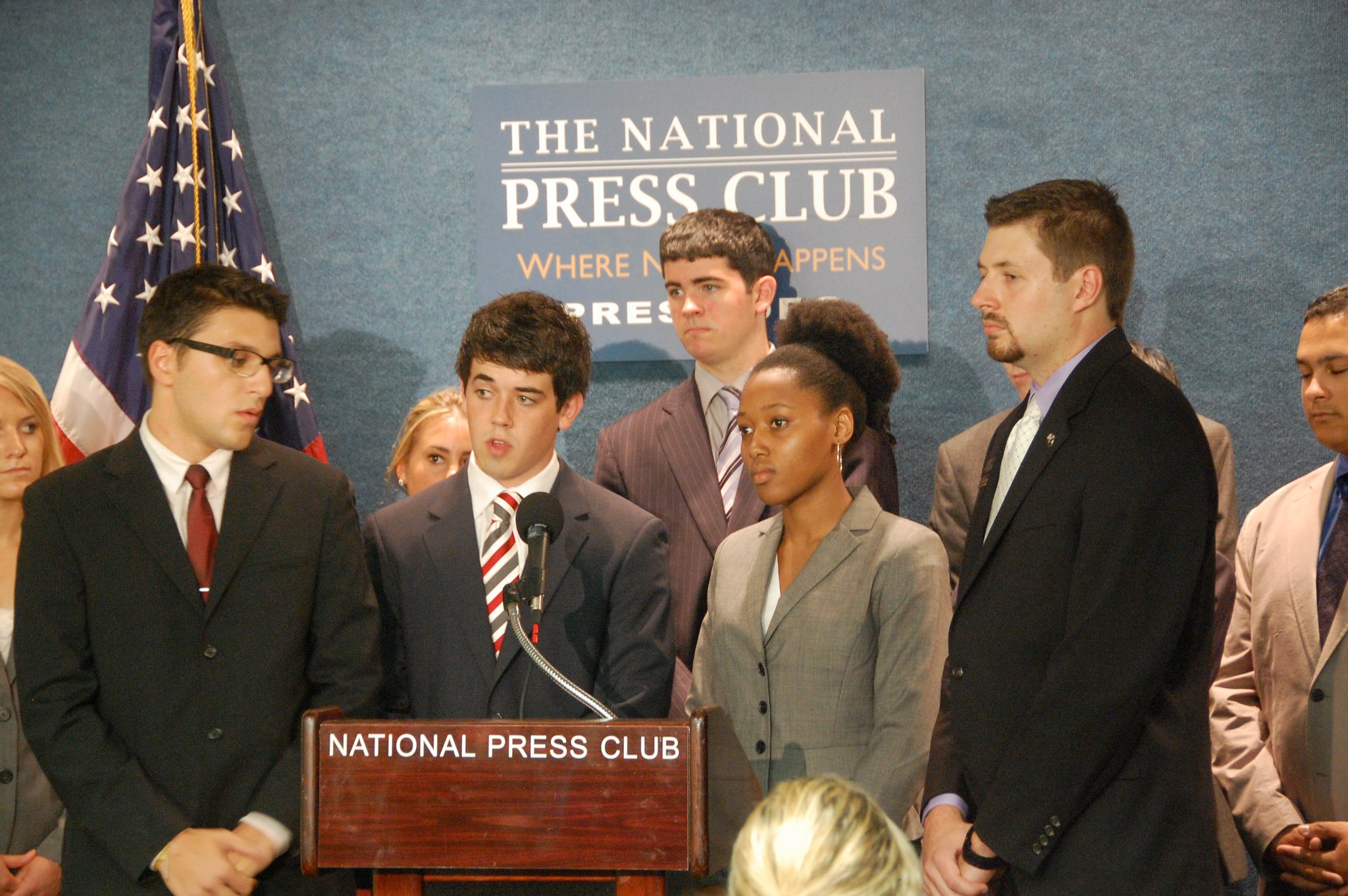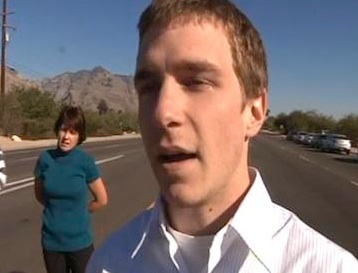Georgetown U. student brings passion to politics

On a 100+ degree day during a long summer, you couldn't blame a college student for taking a day off. But Georgetown University rising senior Mike Meaney is on a call with the President -- President Obama, that is -- about the debt ceiling.

"We had a conference call with the White House today. Over 100 student body presidents called in and we spoke with senior White House staff about our generation's stake in the debt negotiations," he said. "President Obama joined the call and spoke for about five minutes. The contents of the call were strictly off the record, but the President was very gracious and impressed by our efforts, and encouraged us to stay active."
Meaney is a college student sticking around in Washington over the summer, but he is also the president of the Georgetown University Students Association. He has even bigger missions on his mind.
He is involved in the debt ceiling debate gripping the nation's top legislators. Working with over 100 university student government presidents across the country, Meaney is leading his generation to convey this a simple message: "We're asking members of Congress to think about the next generation, not the next election," he says quietly. "We support the principals laid out by Simpson-Bowles and the Gang of Six," he goes on, referring to debt-reduci

ng proposals. "If the goal is to strike a small deal and have the same exact issue come up in six months, that type of plan is absurd. We can't afford as a country to have this process reiterated every six months."
Meaney is only 21 years old. Sitting in Saxby's on a Saturday afternoon in a lime-green polo shirt, he is snacking on pita chips like the other undergrads huddled in this cavern out of the heat.
But his mileage in politics is already long. The Tuscon native, son of an orthopedic surgeon and a geriatrician, worked for Rep. Gabrielle Giffords (D-AZ) during his sophomore year until the spring of 2010. After a semester in Mexico City last fall for his School of Foreign Service degree, Meaney was home in Tuscon for the holidays. He was in touch with Giffords and his friends on her staff in preparation for a normal constituent services meeting the Congresswoman was planning in early January.

Then, the gunfire of a deranged constituent rang out, putting a bullet in Giffords' head and changing the lives of everyone who knew her, including then-sophomore Alex Villec, a fellow student who was three feet from Giffords when she was shot in the head on a Sunday.
"It scared me. She was at a constituent service meeting," Meaney says, quietly indignant. "I had talked with her so many times. She was able to strike this balance between being a politician but having it rooted in the fact that it was her community. It is extraordinarily upsetting." He looks down at the table, then back up.
The tragedy still weighs.
"For my senior year, I was looking at a few internships, I have a lot of interests," the John Carroll scholar says, returning a quick wave to a student in line for coffee. But fellow students wanted him to run for student government President.
There was no one else to do it, they told him. "I came to Georgetown University because I care about politics," he says. The shooting to him was a "terrifying but clarifying reality that this work isn't about an individual -- it's about a cause, a collective."
He agreed to run for President, and won easily.
While Meaney is comfortable in his leadership roles, he brings the same inquisitive mind to his own religious beliefs. "For six or seven years I chose to be very agnostic," Meaney says. As a teenager, he decided not to be confirmed. ("I wasn't ready for it.") But now, "The Jesuits have done a lot to bring me back to see my life as a part of a bigger scheme of people trying to do good."
He references AMDG (ad majorem Dei gloriam), translated as "for the greater glory of God," the Jesuits' motto, as he belatedly considers being confirmed. "For adulthood, I think it's a very grounding thing."
Meaney thought he would follow his parents' path into medicine, but a high school trip to Washington for a model U.N. session suddenly changed his plans. He wanted to work in the world of ideas that could improve people's lives on a macro scale. "Georgetown teaches you to have an open mind," he says. "It prides itself on being a place where ideas can be explored."
Some of his Jesuit mentors would like Meaney to consider a life in the priesthood. He's thought about it. "I think it's every man's duty as a Catholic to consider it," he explains, smiling slightly. "But I'm not even certain about my own faith, so I think that might be jumping the gun a bit." Meaney is a registered Democrat, shaped, he says, by his desire to to help poor people and people who are marginalized.
At a young age, he spoke with a stutter. "I was the kid who couldn't talk," he says. "I have the experience of not being listened to." He knows what it is like to be pushed aside.
The desire to speak for those who are trampled, ignored, and "systematically prevented from advancing" in our fast-paced society drive his politics, and his life.
The raven-haired, easy-going senior in shorts, like other students, is mystified and disappointed by the vitriol of the Georgetown University Campus Plan debate. "It's almost as thought we're children and our parents are in a screaming match" in which the students are caught in a war between the University and the neighborhood.
Meaney took it upon himself to learn about the issues and get involved. He is surprised, he says, that neighborhood leaders have never called, never reached out to have a conversation. Instead, what Meaney hears are attacks on drunk students. "It's condescending. It's really unfair," he says, his voice rising.
But Meaney doesn't spend too much of his time worrying about this. He can't. He is working on immigration policy for the Jesuit Conference near Dupont Circle. He is also the Chief Strategic Officer for Georgetown Energy, a not-for-profit working on renewable energy solutions. He led an "alternative spring break" trip to Arizona and Mexico to work with local priests on the border.
Meany reads New York Times columnist David Brooks ("my favorite journalist") and recently saw Horrible Bosses, the movie starring Jennifer Anniston.
Meaney is thinking about law school, scholarships, perhaps going abroad as a Marshall Scholar. But don't be surprised to see him back in Washington sometime in the future. It wouldn't be outlandish to see him solving the debt crisis or bringing sanity to the nation's immigration policies. And maybe he could even do the seemingly impossible -- bring peaceful resolution to the debate over the University's Campus Plan.
